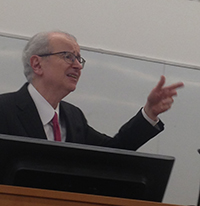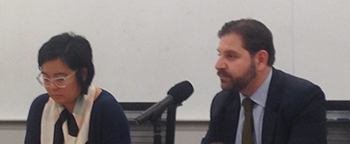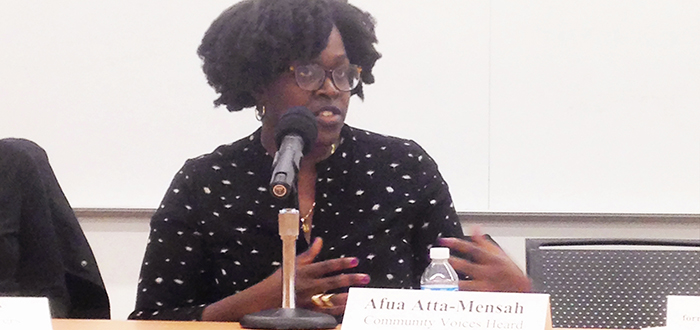Panel takes on contentious issues of housing and eviction in NYC
A panel of speakers, moderated by former New York state chief judge and Fordham Law Access to Justice Initiative co-chair Jonathan Lippman, convened at Fordham Law School on November 29 to discuss challenges facing New York City’s Housing Court system. The event was sponsored by Fordham Law’s Feerick Center for Social Justice and the Center for Court Innovation.
The panel included Fordham Law graduate and current executive director of Community Voices Heard Afua Atta-Mensah ’04, project director of Queens Legal Services Jennifer Ching, civil justice coordinator of the New York City Office of Civil Justice Jordan Dressler, and executive director of

Housing Court Answers Jenny Laurie. The group used Harvard sociologist and MacArthur “Genius” grant recipient Matthew Desmond’s book Evicted, which studies the cyclical relationship between poverty and eviction, to frame its discussion.
“Certainly there are many challenges [facing New York City]in terms of affordable housing, and maintaining the existing housing stock,” said Lippman. “We know more than ever, because of the ongoing homelessness crisis in New York, and its spiraling effect, how important Housing Court is, as is our housing stock in the city.”
The panel discussed the shortcomings of New York City’s Housing Court system, as well as Mayor De Blasio administration’s efforts to reform that institution. Since taking office, De Blasio has effected an increase in tenant-side representation in Housing Court from zero to twenty-seven percent.
“There’s a lot of terrific work happening right now that even in the last two years we didn’t see,” said Dressler, speaking of his work with the city. “We increased investment [in Housing Court]tenfold from what it was in 2013, from roughly six million to sixty-two million…And this is from a court that essentially ran the way traffic court ran, in that there weren’t a lot of lawyers around, although there certainly could be.”

Efforts to provide lawyers for tenants fighting eviction have gotten a recent boost, as the New York City Council has considered the adoption of a Right to Counsel bill. The first of its kind in the United States, according to Lippman, the bill would guarantee legal counsel to those facing eviction proceedings, much in the manner that Gideon v. Wainwright guarantees legal counsel to those facing criminal charges. Lippman said that tenants fighting eviction in court have a seventy-seven percent better chance of success when represented, especially when proceeding against landlords 99% of whom are represented.
However, even with the right to counsel guaranteed, panelists foresaw multiple challenges for Housing Court in the foreseeable future. Several panelists bemoaned the manner in which landlords used tenants’ Housing Court records to preemptively exclude them from consideration for apartments. The commoditization of the rental housing market was also a cause for concern. Panelists even pointed to the moribund state of Housing Court’s physical plant as a sign of the court’s lack of efficacy.
“What we need to do is look at this as an opportunity to change the environment that is Housing Court,” said Atta-Mensah. “Because we know that exemplary representation is something we should expect, but if we’re honest it’s just one part and parcel of the process…Particularly with the political landscape we have right now, I think this is the time for big, bold ideas.”
Photos by Shane Danaher.

